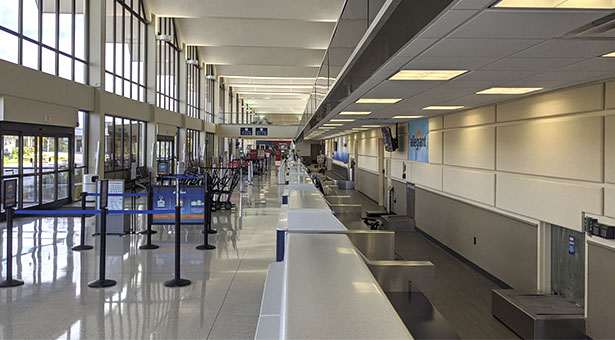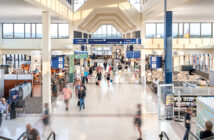Above: The main concourse at Tri-Cities Airport stands deserted at midday. Photos by Scott Robertson
By Scott Robertson
Tri-Cities Airport (TRI) Executive Director Gene Cossey began his April 23 COVID-19 crisis update for the Airport Authority with a sentence of understatement. “There’s a lot to talk about here,” Cossey said, before adding, “We could possibly be here for several hours talking about everything. This has had a huge impact on all of our operations, our finances, and trying to adapt policies to deal with things.”
As Cossey spoke, the airport parking lot, normally a huge revenue generator for the facility, stood empty but for a handful of cars belonging to travelers and a sizable number of cars not being rented out by the airport’s rental car company tenants. The gift shop was closed. And the number of passengers had plummeted.
“Obviously, I think everybody knows that one of the biggest issues we have here is that the airline operations have come to almost a complete halt,” Cossey said. “We are averaging – based on TSA reports that are coming back to us – about 50 to 60 passengers a day.”
The airlines have reduced their scheduled capacity by about 40 to 60 percent between American and Delta. Allegiant has not technically reduced its schedule. It has simply canceled all its flights to and from the TRI. “So even though on the schedule it looks like Allegiant is still flying,” Cossey said, “they basically cancel all their flights on a weekly basis.”
Incoming flights have dropped from an average of 12 per day to six over the last month (three to Atlanta, one to Charlotte and two to Dallas) with the expectation that daily adjustments to flight schedules will continue.
“What we don’t know and what we will not know is how quickly capacity will ramp back up to, what it will ramp up to, or how quickly people will want to start getting on airplanes and flying again,” Cossey said. “Those are all unknowns.”

About that $10 million
The much-hoped-for $10 million in federal CARES Act assistance announced April 14 is in some doubt because Tennessee State Representative Steve Cohen (D-Memphis), sent a letter to the FAA on April 21, asking it to cease making CARES Act payments to airports.
Cohen’s complaint? Smaller airports like TRI are getting proportionately more dollars than larger airports like Memphis. While the TRI is slated to receive $10,300,692, Memphis is scheduled to receive $24,687,552. If one assumes zero other revenue for the airports and expenses running steady, that $10.3 million would cover the TRI for roughly a year-and-a-half. Memphis’ $24.7 million would keep it going for only four months, Cohen said.
“The purpose of the CARES Act emergency relief is to support U.S. airports that are experiencing severe economic disruption caused by the COVID-19 public health emergency,” Cohen said in his letter, “not to bolster or double smaller airports’ budgets based on an arbitrary formula. I respectfully request that the FAA suspend its CARES Act payments to airports immediately until Congress can address this severe funding flaw that is prohibiting adequate support for our nation’s airports.”
It is unlikely Cohen’s objection will result in the loss of funds for the TRI and similar-sized airports, Cossey said, “I am not going to count these eggs in our basket until we are actually awarded the grant.”
The good news is that if and when the airport is made aware it can begin invoicing against that grant funding, Cossey said, “there’s basically no strings attached. We will be able to draw against that grant retroactive to our expenses and costs after Jan. 20. Our plan at this point is to allow it to all be used against expenses and operational needs.
Notwithstanding any efforts to block it, we should be getting that money very quickly, and as soon as we get that money we will start drawing against it for our expenses and our operational needs.” Expenses from Jan. 20 to the present will eat up the first $1.75 million of that $10.3 million. The airport currently has around $2.4 million for operations. The current fiscal year budget called for around $7 million in expenses.
Another bit of good news, assuming the full grant is received, the airport will have access to the full amount for a full four years, so if operations recover quickly and revenue begins to return to normal, the CARES Act funds will still be available to use at the Airport Authority’s discretion. “If we have extra left, we can use it for a normal capital project,” Cossey said, “but my plan right now is that this will be what takes us through this crisis.”
The mechanics of receiving the grant will be handled through an online system called Delphi. As soon as the FAA lets the airports know the grant funds have been issued, the airports may begin drawing monthly expenses against an electronic account in the Delphi system until such time as they deplete the account or four years passes, whichever comes first.
Current operations
There have been no layoffs or furloughs at the airport, though the FAA has indicated it plans to reduce the hours worked by air traffic control tower staff. Allegiant ticket counter workers who have no flights to work are being put to work in custodial roles as the crisis continues.
“We’re doing that for two reasons,” Cossey said. “As much as we can, we don’t want to send people to the unemployment office, and we also think the extra help with maintenance and cleaning is both good for the upkeep of the airport but also to keep the disease from spreading as much as possible.
“Rental car and concessions are basically at zero revenue,” Cossey reported. “The rental car operations are still out there and operating, but they’re pretty much not operating. Enterprise and Hertz are faring better than Avis at this point. Enterprise operates six locations throughout the Tri-Cities and has shut all but the airport and Johnson City locations for the time being.
“We have had one airline and a few rental car companies ask us to defer our receivables from them,” Cossey told the full authority. “They actually asked us to waive them. I told them we cannot and will not waive their fees and payments to us. But in working with staff and Bill Bovender (legal counsel for the TRI) we can defer our receivables from them.” Current plans call for the payments to be deferred until July with increased payments for the following six months to allow the airport to recover the deferred dollars.
“We are obligated to collect those fees. To not do so would be a revenue deferment, which would be an illegal use of revenue,” Cossey explained. “I don’t want to be waiving fees anyway, but I certainly don’t want to put us in a position where the FAA might come in at a later time and say we did so inappropriately.
“This will probably be applied to all three airlines that serve here and all the rental car agencies though,” Cossey added. “We are required to treat everybody equitably.”
The airport has prepaid the parking lot management company for the next three months to avoid parking staff layoffs. “Our parking operations are basically down to nothing,” Cossey said. “We do have those 50 or so people a day coming and going, so there is a minor revenue stream there.
The TailWinds Café and gift shop was forced to stop a renovation only 10 percent of the way through when the crisis hit. The authority debated a request by the owners of the TailWinds franchise for the airport to foot the $287,000 cost of restaurant renovations in exchange for TailWinds paying an additional lease payment for the next 10 years to use the space once operations return to normal.
Pete Peterson, city manager of Johnson City, raised questions about the wisdom of spending nearly $300,000 on renovations at this point in time. “The perceived benefit of it is that when people start flying again, they won’t have to deal with construction in the middle of the terminal,” Cossey said, “and then we’ll have an extra revenue stream that will repay the funds we put in now.”
“If we are receiving federal money, then there is value in keeping projects moving because it helps those contractors, which means local jobs,” said authority member Todd Hensley.
Authority Chair Jon Smith agreed that using the CARES Act funding for the TailWinds project made sense on a broader level. “One of the reasons that the feds are giving us this money is not just for the airport. It’s also to try to insure that the small businesses and the people we do business with manage to stay in operation themselves. So, there is an implicit, if not an explicit assumption on the part of the people who are giving us $10 million that we’re going to use part of this money to support the people we do business with.”
Peterson conceded the points, but asked that the authority be certain of the receipt of the full $10 million CARES Act grant before moving forward. The authority agreed to put off a decision till its next meeting but changed the meetings from bi-monthly to monthly to be able to act more nimbly as necessary in coming months. “This thing can change from day to day,” Smith said. “We can suddenly get well or we can suddenly get a lot sicker.”
The airport has pulled all its advertising, with the exception of a previously paid-for USA Today co-op ad in May and a campaign placed on the expedia website, said Director of Marketing and Air Service Development Kristi Haulsee. “We just felt it wasn’t appropriate to be advertising air travel at this time. We stayed on expedia simply because people go there to actually book trips.
“Our social media strategy we certainly changed dramatically,” Haulsee said. “We really are focused on the airlines and what they have coming out, as well as what’s happening here at the airport. We’re also posting things that are sensitive to what’s going on right now. We also added a page to the airport website updating any changes.”
As if all that weren’t enough, the airport received word that what appears to be a Russian operation has been sending emails to businesses and organizations in the region asking them to link to a bogus Tri-Cities airport site. Haulsee emphasized that triflight.com is the only site operated by the airport. The FBI is investigating the fraudulent site and has confirmed other US airports have also been targeted.
Finally, work on Aerospace Park continues apace. The airport has worked with NETWORKS Sullivan Partnership on a potential project brought by the Tennessee Department of Economic and Community Development, and is working to renew the Tennessee Select Certified Site designation for the park.

Finances through fiscal Q4
Before the coronavirus crisis hit, Tri-Cities Airport was on a pace to increase passenger traffic by a significant amount over the previous year. That fact will help the airport coast to the finish line of the current fiscal year despite what Cossey describes as a “huge decline” since the crisis began.
In analyzing the possibilities for the rest of fiscal 2020, Director of Finance Rene Weber began by deleting two months from the revenue stream of traffic-sensitive revenue (TSR) accounts, including landing fees, terminal space rental, general aviation costs and fuel flow. “An analysis indicates that we lose about $350,000 per month just from those air-traffic-sensitive accounts. That is about 60 percent of our revenues.”
That presents the airport with a small operating loss for fiscal year 2020. “I should add that through February of 2020, we were up significantly,” Weber said. “Our traffic through February, which was eight months ended, had a 12.8 percent increase. So, we’re going down into the valley now, but at least we were on top of the hill when we started the downward roll.”
Weber noted a 45 percent decline in TSR for March, and modeled a 90 percent decline for April, and 80 percent shortfall for May and a 75 percent shortfall for June. That would end the fiscal year with projected revenues 9 percent less than budgeted and projected expenses 0.8 percent less than budgeted. The overall impact nets out to a net operating loss of $331,096 for FY 2020.
Finances in fiscal 2021
In devising a draft budget for FY2021, Weber projected operating expenses to increase slightly, to roughly $7.3 million. His operating revenue projection shows the airport collecting 7.7 percent less than was budgeted for FY 2020. That creates a net operating loss of $683,785.
Cossey had already told the executive committee that the budget for fiscal 2021 will have to be a “living document. The future is very fuzzy right now as far as where things are going for our airport. There is no way to tell over the next six to 12 months how things are going to go.”
Weber said, “From a budget standpoint for 2021, obviously we don’t have some of the tools we normally use for our budgeting process, which includes the rates and charges model which actually spins off from the proposed flight schedules.”
Those flight schedules remain a far-away moving target. “It’s not that they’re not trying,” Cossey says of the airlines. “It’s just trying to figure out the impact this is having to their whole network. It’s not just, ‘What’s the schedule at Tri-Cities?’ It’s what’s the schedule in the whole network they run and how does one domino hit the next domino. Trying to get that schedule for them is a nightmare.”
“We will try to come up with the most accurate budget we can for 2021 in June and we’ll get that approved at the June board meeting, but again, we’re just going to have to be prepared for all kinds of different possibilities and be very adaptive on almost a month-to-month basis.”




